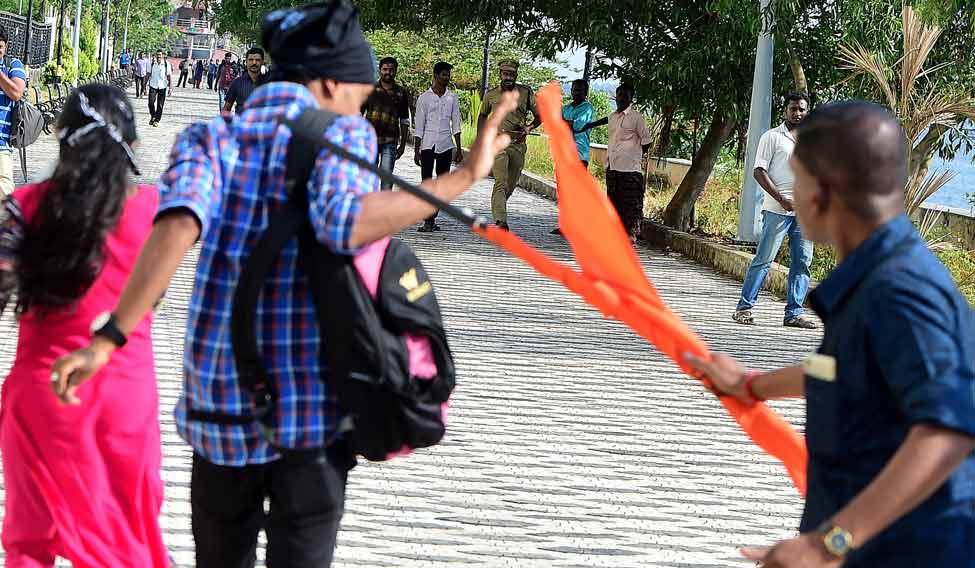If you give a congratulatory hug to your friend belonging to opposite sex, you may be expelled from the school; if you go to the beach with your friend on a Valentine's Day, you may not be alive for the next one; if you share a bench with the opposite sex, your parents may be summoned even if you are an MBBS student, and if you are seen at midnight with a friend you may end up in a police station. These are the sad realities of living in Kerala, touted to be one of the most progressive and literate states in India.
Kerala is increasingly getting caught in the quagmire of moral policing of different shades. Take, for instance, the expulsion of a Class 12 and Class 11 student from a reputed private school in Thiruvananthapuram, because the boy hugged the class 11 student after a stage performance. “It was just a casual congratulatory hug but the teacher who saw them together took it otherwise,” said the parents of one of the two teenagers.
The school went ahead with the disciplinary action despite the fact that both apologised to the management and the teachers. When the parents intervened on behalf of the students, the school got irked further. Both the students were suspended with immediate effect.
The boy appealed to the Kerala State Commission for Protection of Child Rights, which asked the school to take back the students. The school then approached the Kerala High Court, which, on December 12 stayed the panel’s decision. The court, however, said that the school management’s action was not illegal or unfair since it was taken in order to maintain the institution’s reputation.
The fact that the school used the teenagers' Instagram pictures to prove their “indecent activities”, has shocked many.
“The school is behaving like Taliban. We are living in a free society and such punitive measures for such a small thing is quite shocking,” said Adraja Pillai, whose child used to study in the school.
But school authorities insist that they did everything with good intention.
“The issue affects the morality and discipline of the school. Parents entrust the school with the responsibility of their children. Hence, we have to act accordingly,” said Sebastian T. Joseph, principal of the school.
The teenagers have, however, decided to approach the High Court again.
Last month, in Kochi, a woman cameraperson was detained by the police as she was found “all alone” at midnight. She had to spend the night at the police station. She alleged that the police officers wanted to know her whereabouts and also used abusive language at her.
However, police had denied the allegations stating that the beat officers had approached her to ensure that she was not in any kind of trouble and it was the duty of the police to ensure the safety of women walking alone at night.
Again, last month, the students of Thiruvananthapuram Medical College were at the receiving end of moral policing, when the faculty objected to male and female students sitting together in a classroom.
“We decided to sit together after attending a seminar on gender sensitisation. But it irked a few faculty members. We were really shocked when such a small issue was blown out of proportion,” a first year student told THE WEEK on conditions of anonymity. She said the parents were brought into the picture after the students opposed the move.
The PTA, however, decided not to impose any restrictions on students sitting together.
A similar incident had happened in Farook College in Kozhikode, too, where restrictions were imposed on male and female students mingling with each other on the campus. The matter was hushed up after politicians and people raised the issue.
“Kerala, despite its tall tales on women empowerment, is actually a very regressive society. It may be the only state which does not have a dance form where men and women perform together. It says a lot about the society,” said Nishad Puthoor, writer and activist.
In Kollam early this year, Aneesh, 24, and his girl friend had gone to the beach on Valentine's Day. They were harassed by a gang of five drunken men, who posted the duo's photos and videos on social media. The two were trolled and abused for days before the video was removed. Ten days later, Aneesh’s body was found hanging from a tree, nearly 50m away from his home in Palakkad.
In a similar incident last year, a man was beaten to death in Malappuram by a gang in a suspected case of moral policing.
“Outsiders may find it unbelievable that such things happen in Kerala. But what they don't know is that Kerala has always been regressive when it comes to moral codes,” said activist Elizabeth Koshy. She said the rising right-wing extremism coupled with the rigid moral codes of minority religions are responsible for these incidents.
“When you are prone to consider sex as sin, these issues are bound to happen,” she said.






